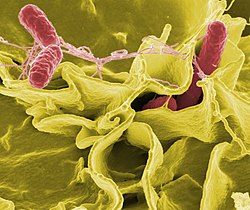Salmonella
Salmonella[1] is a genus of bacteria. It is a major cause of illness throughout the world. The bacteria are generally passed on to humans by eating or drinking food of animal origin which has the bacteria in it, mainly meat, poultry, eggs and milk. Bacteria from the genus Salmonella can cause diseases, such as diarrhea, cholera and typhus. These bacteria are zoonotic, meaning they can infect both animals and humans.
| Salmonella | |
|---|---|

| |
| Scientific classification | |
| Kingdom: | |
| Phylum: | |
| Class: | |
| Order: | |
| Family: | |
| Genus: | Salmonella Lignieres, 1900
|
| Species | |
Salmonella is closely related to the Escherichia genus and are found worldwide in cold- and warm-blooded animals (including humans), and in the environment. They cause illnesses like typhoid fever, paratyphoid fever, and foodborne illness.[2]
Salmonella is also extremely dangerous, and like most diseases, weaker humans like the old and young could easily die from it. Salmonella can only be killed in food by cooking at high temperatures. This is called denaturation.
References change
- ↑ Salmonella is typically pronounced /ˌsælməˈnɛlə/ voicing the initial letter "L," since it is named for pathologist Daniel Elmer Salmon.
- ↑ Sherris Medical Microbiology (4th ed.). McGraw Hill. 2004. pp. 362–8. ISBN 0-8385-8529-9.